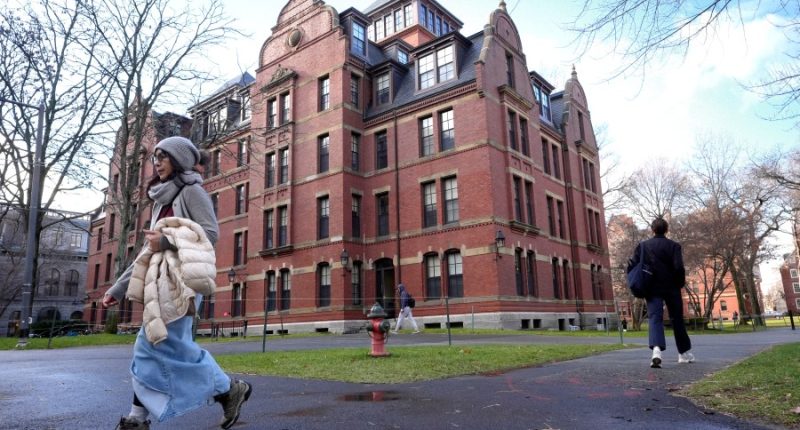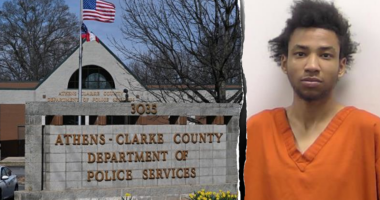Share this @internewscast.com

WASHINGTON (AP) — President Donald Trump’s efforts to eliminate diversity, equity, and inclusion (DEI) initiatives on college campuses are stirring debate. While DEI as a concept is polarizing, new poll results suggest that some specific programs affected by his administration’s policy might not be as contentious.
According to a recent survey by The Associated Press-NORC Center for Public Affairs Research, conducted earlier this month, approximately four out of ten Americans either “strongly” or “somewhat” support DEI programs at colleges and universities. In contrast, around three out of ten oppose these initiatives, with another three out of ten remaining neutral.
There is notably higher support for courses on racism and scholarships aimed at students of color, as well as other services that assist students from underrepresented communities.
The findings underscore that while “DEI” has become a politically toxic and unpopular term for many Americans, some components of DEI programs have much less opposition.
This is especially true among Republicans. While about 6 in 10 Republicans oppose DEI programs broadly, their opposition softens for many of their most common elements. Just under half of Republicans oppose courses that teach about racism. About one-third oppose scholarships for students from underrepresented groups. And roughly 3 in 10 oppose clubs and mentorship services for those students.
About 7 in 10 Democrats, by contrast, favor DEI programs on college campuses, with similar shares supporting courses that teach about racism and scholarships or extracurricular support services for students from underrepresented groups.
Divides reflect different views of DEI’s meaning
Some of this tension may stem from differing perspectives on what DEI means.
“I’m dead set against DEI,” says poll respondent Robert Ayala, an 81-year-old registered independent who leans Republican. His understanding of DEI is “giving someone a free ride” or hiring people based on their skin color, as opposed to their skill set.
But Ayala says he fully supports scholarships and mentoring to help disadvantaged students. Ayala, who has Mexican ancestry, grew up poor in rural South Dakota, faced prejudice as a child and lacked career direction. “If I was offered a scholarship or training or had somebody to guide me, I might have found my way faster,” says Ayala, who spent 22 years in the Navy, then went into contracting and is now retired near Palm Springs, California.
Trump, a Republican, has signed multiple executive orders to eliminate diversity practices in the federal government, private companies and in education, calling them “illegal” and “immoral.” He has threatened to cut federal funding to campuses that defy him. Some of his orders are being challenged in court.
On campuses, students of color say colleges responding to the new guidance have cut back scholarships, diversity offices and mentors that made them feel welcome on predominantly white campuses.
“Everybody should have the same opportunities as everybody else,” says Stanley Roberts, 61, a registered Republican near Knoxville, Tennessee. He is “somewhat” opposed to the idea of DEI and is “on the fence” about courses that teach about racism because he thinks dwelling on the past creates division. “What happened 200 years ago or 1,000 years ago shouldn’t have happened,” he says, “but if everybody would quit talking about it, it would be a whole lot less of a problem.”
White adults are more likely to oppose DEI programs
The poll shows that white adults are more likely than Black and Hispanic adults to oppose DEI programs.
Black adults are more likely than U.S. adults overall to favor courses that teach about racism.
“I know this sounds cliché to say, but the reason I favor teaching about racism is so history doesn’t repeat itself,” says Nicole Martin, 34, a Black social worker in Idaho Falls, Idaho. “I hear a lot of, ‘Oh, just get over it.’ But I think, ‘OK you don’t want to talk about slavery. But we’re still talking about the Holocaust and that’s OK.’”
The poll found that women are more likely than men to say they support DEI programs on college campuses, as well as support services for students from underrepresented groups.
“Without DEI, I am not sure there are many chances for understanding other people’s experiences,” says Regina Cuddeback, 27, a Democrat in Cortland, New York, who says her support for DEI depends on the context.
Cuddeback does not think race should factor into college admissions but DEI programs on campuses are “completely fine,” and she does not think the federal government should have a say in the courses colleges offer.
“Students have a right to take the classes they want to take,” says Cuddeback, who is white and a registered Democrat. “For a college to remove a class and say you don’t get to learn a certain subject anymore would be pretty abysmal.”
___
Gecker reported from San Francisco.
___
The AP-NORC poll of 1,175 adults was conducted May 1-5, using a sample drawn from NORC’s probability-based AmeriSpeak Panel, which is designed to be representative of the U.S. population. The margin of sampling error for adults overall is plus or minus 4 percentage points.
___
The Associated Press’ education coverage receives financial support from multiple private foundations. The AP is solely responsible for all content. Find the AP’s standards for working with philanthropies, a list of supporters and funded coverage areas at AP.org.
















